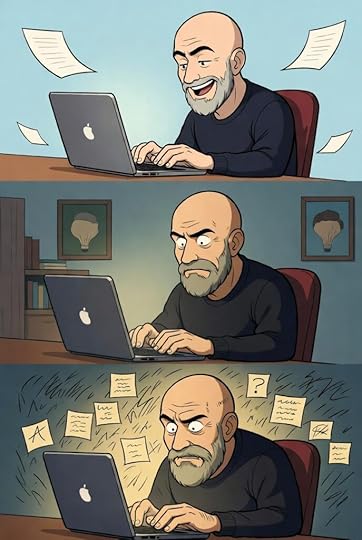When the Book Goes Wild

It began as an elegant conceit. I was going to explain taste. Clarify it, render that slippery word into something crystalline and precise. It was, I thought, a simple matter of distilling my impeccable sensitivity into the essence of style: a non-fiction exploration of what it means to have elegance, discernment, judgement.
Of course, I realized what a ludicrous idea that was for all the reasons given above. Taste resists dissection. The moment you try to explain it, it dissolves, like sugar in rain.
So I pivoted. I would write a novel. A light, comic thing about an absurdly aesthetic critic who discovers, to his horror, that he has become irrelevant. A man once capable of silencing a room with a raised eyebrow, now silenced himself by the tide of the new. His redemption would come through a chaos pixie, a creature of feeling and spontaneity, who teaches him not to curate life, but to feel it.
It was going to be fun. I was excited. I was in control.
Then, somewhere between one draft and the next, the floor gave way.
The comedy began to darken. The critic’s isolation, which I’d first written for amusement, began to look suspiciously like my own. His loss of purpose stopped being a narrative device and started to ache. The chaos pixie’s laughter, at first a bright counterpoint, became something wilder, more necessary, more dangerous. And through all of this, uninvited but unmistakable, came grief… my own, still unprocessed, still raw.
I lost my mother.
And the book I thought I was writing, this tidy, sparkling satire, has mutated into something else entirely.
The project has become feral. No longer the obedient servant of my ideas, but a creature with its own strange will.
And I hate it for that and I’m irritated with myself. For losing control, for turning what was meant to be bright and playful into something unruly and sentimental. Every time I open the document, I feel the push and pull of love and loathing. I’m failing, I think. The book was supposed to illuminate taste, and instead it’s darkening and disappointing me.
But I suppose that’s what large creative projects do, eventually. They start as ambitions and end as mirrors. What begins in clarity inevitably blurs; what begins as control becomes surrender. Somewhere in the middle, you realize that the thing you’re making has begun to make you. Not in the triumphant, artistic sense, but in the slow, humbling way that life remakes you through tragedy.
There are still moments, sparkles of inspiration, where I glimpse the heart of it all. A line that lands just right. A scene that feels honest and unironic. A sudden understanding that the chaos pixie was never another person at all, but perhaps the unruly part of me that has always fought against the grief.
Those moments keep me writing. They’re the glints of light on the surface of a river that’s otherwise dark and unmanageable.
In a moment of weakness I tried to force someone else to read it, to seek reassurance that what I was doing was not self-indulgent and pointless. But in craving validation I realised that I was trying to justify the wrong thing.
Maybe all writing projects are like this in the end: they begin as explorations and end as experiences. You start out trying to understand taste, or beauty, or grief, and you wind up living inside them instead.
And maybe that’s not failure. Maybe that’s the only real success there is.



